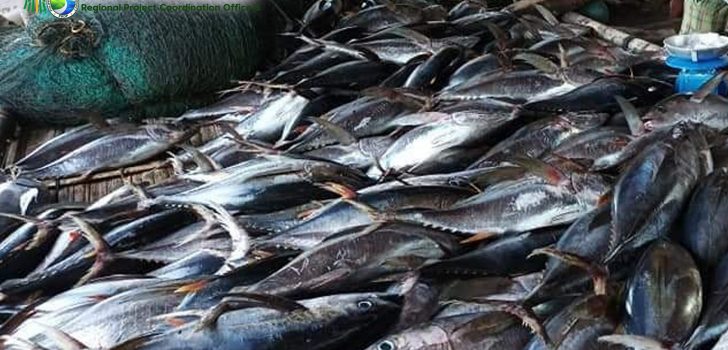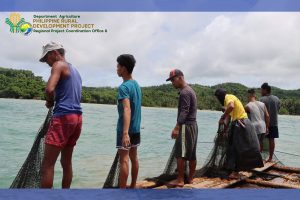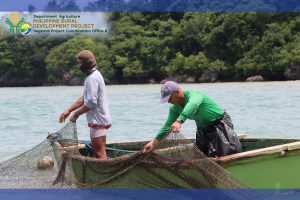 Lambaklad is a fishing method using nets and ropes instead of bamboo poles laid down in a deep portion of the sea. It resembles the operation of the ordinary bamboo stake trap but differs mainly in the materials and method of construction. It is also considered as an environment-friendly fishing gear.
Lambaklad is a fishing method using nets and ropes instead of bamboo poles laid down in a deep portion of the sea. It resembles the operation of the ordinary bamboo stake trap but differs mainly in the materials and method of construction. It is also considered as an environment-friendly fishing gear. Waves of opportunities for lambaklad fisherfolk in Libertad, Antique
Braving the seas despite the unstable weather is a daily grind for the fisherfolk in Barangay Taboc, Libertad, Antique. Being a coastal municipality in the province, the livelihood of the people is devoted to fishing. In the year 2013 however, super typhoon “Yolanda” (international name: Haiyan), has lashed its force in the entire Visayan region, leaving an immense damage to the livelihood of the people.
After suffering from a great turmoil, the fishermen in Libertad had a difficult time to recover from the brink, not until the Department of Agriculture’s Philippine Rural Development Project (DA-PRDP) has provided interventions to restore their typical daily activities and their livelihood. Through the provision of financial assistance and trainings to Taboc Fisherfolks Association (TAFA), the members started to manage their livelihood project.
TAFA was organized in August 2013 with 112 members and was registered at the Department of Labor and Employment (DOLE) in July 2015. With a total project cost amounting to P999,950 jointly funded by the World Bank, DA-PRDP, Provincial Local Government Unit of Antique, and TAFA counterpart, the association started their Lambaklad Livelihood Project on November 14, 2017 which allowed them to re-engage in fishing and as well as provide employment to at least 25 fishermen crew for the sustainability of its operations.
“After the typhoon Yolanda had left a huge damage to our livelihood, we truly lost our hope. So, when PRDP provided us funding assistance and introduced the lambaklad which is a different method of fishing, we readily bought the materials for our operations such as nets, ropes, empty sacks, plastic needles, nails for the paddle boat, sinkers, ball float, motor boat, and bamboos,” said Eustaquio S. Daypuyart, former Chairman and now member of TAFA.
Lambaklad is a fishing method using nets and ropes instead of bamboo poles laid down in a deep portion of the sea. It resembles the operation of the ordinary bamboo stake trap but differs mainly in the materials and method of construction. It is also considered as an environment-friendly fishing gear. With this newly-introduced fishing technique, the Provincial Agriculture Office of Antique sent a master cutter to the association to form the lambaklad.
The regular operators or buso in the dialect, are the ones setting it up which takes about three to four days. The TAFA members use a variety of nets (in millimeters) with 11mm, 7mm, 5mm, 4mm, and 3mm holes for their operations. Different rope sizes are also being used for the construction of the main fishing equipment such as 32 mm, 24 mm, 20mm, 18mm,16mm, and 14mm. The ties for boats used for fishing were 7mm and 6mm-sized while the 2mm is used to serve as joint of the ties.
Meanwhile, the sacks were filled sand and lowered down to the seabed to serve as its anchor or pondo. After sewing the nets and preparing the materials needed, the buso members use a double-deck boat made of bamboo or locally known as balsa to transport the sacks with sand and other needed materials in forming the frame of the lambaklad. It takes about three (3) days to complete the process. Soon after, the nets, ball float, and styro were placed in the area to prevent the ropes from sinking. It takes another 4 hours the next day to set up the hemmed nets on the site. Since lambaklad is stationary, they designated guards in the sea from 7:30 in the morning up to 5 in the afternoon who would check underneath if there are fishes entering the area called as the “playground” and will signal the other buso off-shore, then immediately close the eye of the net to begin the hauling.
The TAFA also uses a pulling gear which they call as galingan placed in both sides of the balsa to draw up the hauling rope – two people are tasked to do the grinding while the other two are assisting the hauling rope. As soon the net is already fetched up, it is the time that the buso will get the fishes caught inside the net.
The enterprise follows a 1/3-2/3 sharing scheme with 1/3 of the daily catch goes to the buso members and the 2/3 serves as the association’s share. “We also have a different sharing among the buso scheduled as guards in the sea on a daily basis. They were given 10% incentives of the total catch as per agreed with the association which we have replicated from the practices of the other lambaklad operators. This is a way to maintain the operations daily and is advantageous during the season of the lambaklad where we haul at least 3-5 times a day,” Daypuyart explained.
Before starting the operations, the master fisherman conducts a meeting with the other members and assign a person that would guard the nets installed in the sea. Mirroring the olden way of assembly, a one meter bamboo is being knocked with another bamboo three times to gather all the buso to sail off to the lambaklad area as soon as the assigned guard on-site gives a signal through a flag or bandera, signifying that there are already fishes entering the fishing equipment.
“One thing that is important in following this system is that we can easily close it once the fishes are seen to enter the net by the person in-charge guarding the lambaklad. By that, we can immediately haul,” added Daypuyart. The association started with 25 fishermen crew maintaining the operations and on a shifting scheme but they are now down to 20 members, deeming their safety with respect to the holding capacity of the boats.
Likewise, TAFA observes a one-week nets-off so that the moss won’t block the eye of the lambaklad net, allowing to attract more fishes to enter the area once installed. During nets-off, the buso are sewing the nets where they are as well compensated with P100 allowance per day and with two meals included.
Moreover, not only were they able to receive funding for their enterprise but also various technical support from the PRDP. The member beneficiaries were trained on Fish Handling, Food Safety, Sanitation Standard Operating Procedures (SSOP) and Good Manufacturing Practices (GMP) as well as strengthening and capability-building for its officers on Basic Bookkeeping, Financial Management and Reporting through the Office of the Municipal and Provincial Agriculturists in collaboration with the Department of Agriculture Region 6.
“We were able to utilize the learnings we have had from the trainings, reason why we are sailing at our fourth year of operation this time. With the lambaklad method, there is what we call as jackpot- if there are many fishes that would enter the area, we can catch tons of fish,” said Daypuyart.
In fact, on July 9, 2021, TAFA was able to catch approximately 2 tons of yellow fin tuna which serves as their highest fish catch for the record. Despite being still on the phase of development during their first two years of operations, TAFA was able to have dividend sharing among its members.
When the pandemic came in 2020 up to present, this posted a challenge to the association particularly on the marketing aspect of their product. “Since the emergence of pandemic, it is also the season of lambaklad operations. We had a hard time disposing our products since the borders were closed and the marketing was only done from border to border,” shared Daypuyart.

“We were able to utilize the learnings we have had from the trainings, reason why we are sailing at our fourth year of operation this time. With the lambaklad method, there is what we call as jackpot- if there are many fishes that would enter the area, we can catch tons of fish,” said Eustaquio S. Daypuyart, former Chairman and now member of TAFA.
In contrary, he also imparted how they were able to overcome the situation and adjusted to what we call “the new normal.” “Fortunately, all of the members are genuinely supportive with the project. We shifted our marketing strategy since then. After collecting the cellphone numbers of buyers from the neighboring towns, we are contacting them for pick up instead. Some members are also buying at bulk and sell our catch themselves,” he said.
Hence, amidst the waves of challenges bouncing on and off the shore, the Taboc fisherfolk are filled with hope as they continue to strive to better their livelihood. Since PRDP extended its hands when they hit rock-bottom, waves of opportunities came along the process of climbing their way back up. Coupled with their perseverance and unity, the fisherfolk in Libertad will continue prosper—it is inevitable. (April Grace Padilla, RPCO 6, Writer)

